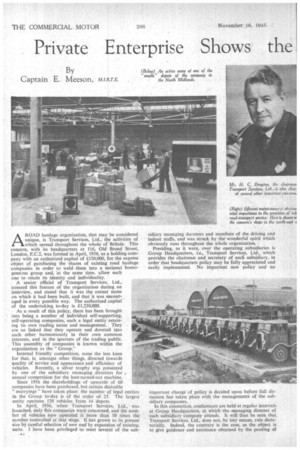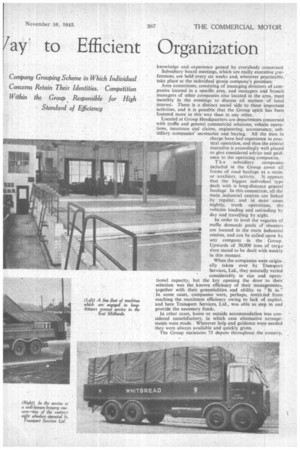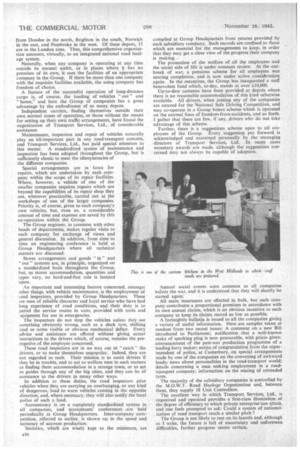Private Enterprise Shows the 7ay to Efficient Organization
Page 26

Page 27

Page 28

If you've noticed an error in this article please click here to report it so we can fix it.
By
Captain E. Meeson, M.1.R.T.E.
AROAD haulage organization, that may be considered unique, is Transport Services, Ltd., the activities of which spread throughout the whole of Britain. This concern, with its headquarters at 116, Old Broad Street, London, E.C.2, was formed in April, 1936, as a holding company with an authorized capital of £130.000, for the express object of purchasing the shares of existing road haulage companies in order to weld .them into a national homogeneous group and, at the same time, allow each one to 'retain its identity and individuality.
A senior official of Transport Services, Ltd., stressed this feature of the organization. during an interview, and stated that it was the corner stone on which it had been built, and that it was encouraged in every possible way. The authorized capital of the undertaking to-day is £1,250,000.
As a result of this policy, there has been brought into being a number of individual self-supporting, self-operating companies, each a legal entity retaining its own trading name and management. They are so linked that they operate and dovetail into each other harmoniously in their own common interests, and in the interests of the trading public. This assembly of companies is known within the organization as the "Group."
Internal friendly competition, none the less keen for that, is, amongst other things, directed towards quality of service and appearance and efficiency of vehicles. Recently, a silver trophy was presented by one of the subsidiary managing directors for annual competition for the best-turned-out machine.
Since 1936 the shareholdings of upwards of 60 companies have been purchased, but certain desirable ". marryings " have taken place: the number of legal entities in the Group to-day is of the order of 25. The largest entity operates 120 vehicles from 14 depots.
In April, 1936, when Transport Services, Ltd., was launched, only five companies were concerned, and the number of vehicles now operated is more than 10 times the number controlled at that stage. It has grown to its present size by careful selectirin of new and by expansion of existing. units. I have been privileged to meet several of the sub sidiary managing diroctors and members of the driving and indoor staffs, and was struck by thewonderful spirit which obviously runs throughout the whole organization.
Presiding, as it were, over the operating subsidiaries is Group Headquarters, i.e., Transport Services, Lid., which provides the chairman and secretary of each subsidiary, in order that headquarters policy may be fully appreciated and easily implemented. No important new policy and no important change of policy is decided upon before full discussion has taken place with the managements of the subsidiary companies.
In this connection. conferences are held at regular intervals at Group Headquarters, at which the managing director of each subsidiary company attends. It will thus be seen that Transport Services, Ltd., does not, by any means, rule dictatorially. Indeed, the contrary is the case, as the object is to give guidance and assistance obtained by the pooling of
knowledge and experience gained by everybody concerned Subsidiary board meetings, which are really executive wonferences, are held every six weeks and, wherever practicable, take place at the individual group company's premises.
Area committees, consisting of managing directors of companies located in a specific area, and managers and branch managers of other companies also located in the area, meet monthly in the evenings to discuss all matters of local interest. There is a distinct social side to these important activities, and it is possible that the Group spirit has been fostered more in this way than in any other.
Located at Group Headquarters are departments concerned with traffic and general commercial relations, vehicle operations, insurance and claims, engineering, accountancy, subsidiary companies' secretariat and buying. All the men in charge have had experience in practical operation, and thus the central executive is exceedingly well placed to give considered advice and guid-, ance to the operating companies.
T h e subsidiary companies included in the Group cover all forms of road haulage as a main. or auxiliary, activity. It appears that the biggest individual type dealt with is long-distance general haulage. In this connection, all the main industrial centres are linked by regular, and itt most cases nightly, trunk operations, the vehicles loading and unloading by day and travelling by night.
In order to level the vagaries of traffic demands pools of shunters are located in the main industrial centres, and can be called upon by any company in the Group. Upwards of 30,000 tons of cargo Were stated to be dealt with weekly in this manner.
When the companies were origin-, ally taken over by Transport Services, Ltd., they naturally varied considerably in size and opera tional capacity, but the key opening the door to their selection was the known efficiency of their managements, together with their potentialities and ability to "fit in." In some cases, companies were, perhaps, restricted from reaching the maximum efficiency owing to lack of capital, and here Transport Services, Ltd., was able to step in and provide the necessary funds. In other cases, home or outside accommodation was considered unsatisfactory, in which case alternative arrangements were made. Wherever help and guidance were needed they were always available and quickly given. The Group maintains 75 depots throughout the country,
from Dundee in the north, Brighton in the south, Norwich in the east, and Pembroke in the west. Of these depots, 15 are in the London area. Thus, this comprehensive organization amounts, virtually, to an integrated national road haulage system.
Naturally, when any company is operating at any time outside its normal ambit, or in places where it • has no premises of its own, it uses the facilities of an appropriate company in the Group. If there be more than one company with the requisite facilities available, the using company has freedom of choice.
• A feature of the successful operation of long-distance cargo is, of course, the loading of vehicles " out " and "home," and here the Group of companies has a great advantage by the embodiment of so many. depots. Independent carriers, finding themselves outside their own normal zones of operation, or those without the means for setting up their own traffic arrangements, have found the organization of Transport Services, Ltd., of considerable assistance.
Maintenance, inspection and repair of vehicles naturally play an all-important part in any road-transport concern, and Transport Services, Ltd., has Paid special attention to this matter. A standardized system of maintenance and inspection has been adopted throughout the Group, but is sufficiently elastic to meet the idiosyncracies of the different companies.
Special arrangements are in force for repairs, which are undertaken by each com pany within the scope of its repair facilities.
Where, however, a vehicle of One of the smaller companies requires repairs whichare beyond the capabilities of its repair shop they are, wherever practicable, tarried out at the workshops of one of the larger companies.
Priority is, of course, given to each company:s own vehicles, but, even so, a considerable amount of time and expense are saved by this co-operation within the Group.
The Group engineer, in common with other heads of departments, makes regular visits to each company for exchange of views and general discussion. In addition, from time to time an engineering conference is held at Group Headquarters where all technical matters are discussed.
Stores arrangements and goods " in " and " out " systems are, in principle, organized on a standardized basis throughout the Group, but, as stores accommodation, quantities and types vary, no hard-and-fast rule is insisted upon.
An important and interesting feature concerned, amongst other things, with vehicle maintenance, is the employment of oad inspectors, provided by Group Headquarters. These ire men of reliable character and loyal service who have had long experience of road conditions, and their duty is to patrol the service routes in vans, provided with tools and equipment for use in emergencies.
The inspectors do not stop the vehicles unless they -see something obviously wrong, such as a slack tyre, shifting load or some visible or obvious mechanical defect. Every advice and assistance are offered without giving actual instructions to the drivers which, of course, remains the prerogative of the employer concerned.
These road inspectors are in no way out to " catch " the drivers, or to make themselves unpopular. Indeed, they are not regarded as such. Their mission is to assist drivers if they be in trouble, and to act as welfare men in such matters as finding them accommodation in a strange town, or to at as guides through any of the big cities, and they can be of assistance to the drivers in many other ways.
In addition to these duties, the road inspectors pilot vehicles when they are carrying an overhanging, or any kind of dangerous, load to warn vehicles coming in the opposite direction; and, where necessary, they will also notify the local police of such a load.
Accountancy is on a cq,mpletely standardized system in • all companies, and accountants' conferences .are held periodically at Group Headquarters. Inter-company competition, referred to earlier, is shown -up in the speed and accuracy of accountproduction.
Statistics, which are wisely kept to the minimum, are compiled at Group Headquarters from returns provided by each subsidiary company. Such records are confined to those which are essential for the managements to keep, in order that they may get a clear view of the progress their company is making.— The promotion of the welfare of all the cniployees and the social side of life is under constant review. At the outbreak of war, a pensions scheme for all employees was nearing completion, and is now under active consideration again. In the meantime, the Group has inaugurated a staff benevolent fund which, to-day, stands at over £10,000.
Up-to-date canteens have been provided at depots where there is no reasonable accommodation of. this kind otherwise available. All .drivers, when joining any of the companies are entered for the National Safe Driving Competition, and may co-operate in a Group bonus scheme whioh is operated on the normal lines of freedom-from-accidents, and so forth. . I gather that there are few, if any,, drivers who do not take advantage of this scheme,
Further, there is a suggestionsopen to all employees of the Group. Every. suggestion put forward is acknowledged and examined personally by the managing directors of Transport Services, Ltd. In many cases monetary awards are made, although the suggestions concerned may not always be capable of adoption.
Annual social events were common to all companies before the war, and it is understood that they will shortly be started again: All main insurances are effected in bulk, but each company contributes a proportional premium in accordance with its own annual claims, which is an obvious incentive to each company to keep its claims record as low as possible. A fortnightly bulletin is issued to allthe companies giving a variety of useful information. Here are samples taken at random from two recent issues: A comment on a new Bill introduced to Parliament; notification that a well-known make of sparking plug is now procurable, with prices given; announcement of the post-war production programme of a leading lorry maker; notice.of congratulation from the superintendent of police, at Canterbury, on special arrangements made by one of the companies on the convoying of awkward loads; news about personalities in the road-transport world; details concerning a man seeking employment in a roadtransport company; information on the mating of retreaded tyres. The majority of the subsidiary companies is controlled by the M.O.W.T. Road Haulage Organization and, between them, they supply 18 Unit Controllers.
The excellent way in which Transport Services, Ltd., is organized and operated provides a first-class illustration of the degree of efficiency to which private enterprise-can attain, and one feels prompted to ask: Could a system of nationalization of road transport reach a similar pitch ?
The-Group is not likely to rest on its laurels and, although as I write, the future is full of uncertainty and unforeseen difficulties, further progress seems certain.




















































